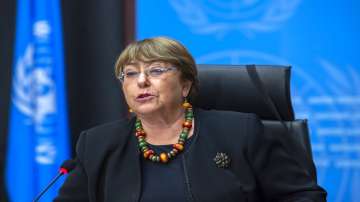Allegations of human rights abuses in China's northwestern Xinjiang region are the dominant issue on a visit by the United Nations' top rights official that starts Monday. Michelle Bachelet's visit is the first to China by a U.N. high commissioner for human rights since 2005, but rights groups warn it threatens to whitewash the ruling Communist Party's abuses in Xinjiang.
China has locked up more than a million members of its Uyghur, Kazakh and other Muslim minorities in what critics describe as a campaign to obliterate their distinct cultural identities. China says it has nothing to hide and welcomes all those without a political bias to visit Xinjiang and view what it describes as a successful campaign to restore order and ethnic cohesion.
Bachelet will begin her six-day visit in the southern city of Guangzhou before traveling to Kashgar and the Xinjiang regional capital of Urumqi. Details have been tightly held and China's entirely Communist Party-controlled media have not reported on her visit. A key question is whether Bachelet will be allowed to visit the now-largely empty internment camps that China calls reeducation centers and meet with figures imprisoned over calls for greater religious, political and cultural freedoms, such as Ilham Tohti, an economist and winner of the Sakharov Prize.
China has also been accused of using forced labor, coercive birth control and separating children from their incarcerated parents, and monitoring group The Dui Hua Foundation says fasting for Ramadan or selling Islamic books has also been targeted. It's also not clear whether Bachelet will be able to meet with officials who have led the crackdown in Xinjiang, including former party secretary Chen Quanguo, now an official in Beijing.
Bachelet plans to speak with high-level national and local officials, civil society organizations, business representatives and academics, and deliver a lecture to students at Guangzhou University. Rights groups have called for more information and accountability from China over its policies in Tibet and Inner Mongolia that restrict minority cultural rights. A crackdown on freedoms in Hong Kong has also led the U.S. and others to sanction local and Chinese central government officials.
Amnesty International said Bachelet must “address crimes against humanity and gross human rights violations" during her trip. “Michelle Bachelet's long-delayed visit to Xinjiang is a critical opportunity to address human rights violations in the region, but it will also be a running battle against Chinese government efforts to cover up the truth," Agnes Callamard, Amnesty International's Secretary-General said in a statement.
“The U.N. must take steps to mitigate against this and resist being used to support blatant propaganda,” Callamard said. Bachelet's trip comes ahead of the long-awaited release of a report on alleged human rights abuses in Xinjiang. Almost 200 rights groups have urged Bachelet to release her report, which diplomats have said has been ready — or very close to it — for months.
The U.S. government has declared that Beijing's policies against the Uyghurs amount to genocide and crimes against humanity. Legislatures in Britain, Belgium, the Netherlands and Canada have done the same. China denies the allegations and maintains its policies were meant to deradicalize those influenced by jihadi propaganda following years of violent outbursts against Chinese rule in the region.
ALSO READ | US announces new Indo-Pacific Economic Framework to counter China, India signatory
ALSO READ | Quad summit: Indo-Pacific strategy 'bound to fail', says China
Latest World News
